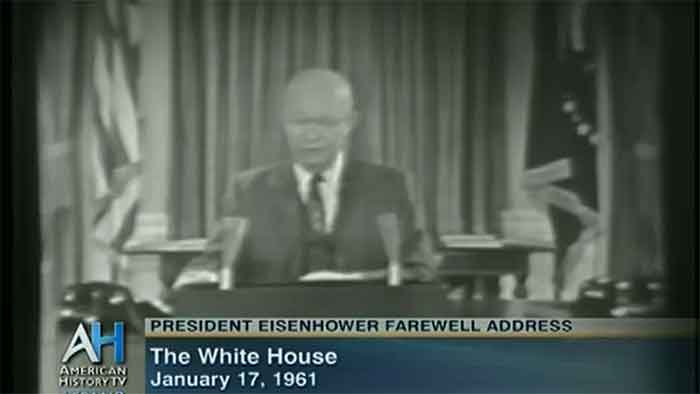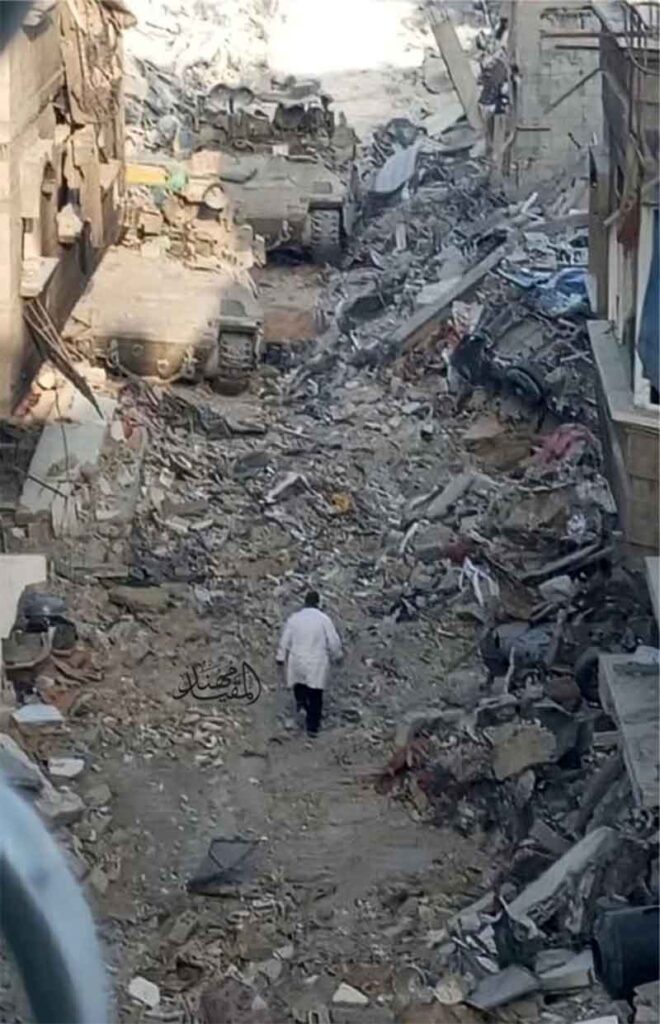
Dwight D. Eisenhower had the special distinction of being a very highly decorated and senior five-star military general in-charge of some of the most crucial battles of the second world war who went on to become two-term President of the USA in the important post war phase ( 1953 -1961). When his maximum allowed 8 years of two terms were over, in early 1961 he delivered a most memorable farewell speech which is frequently remembered as the speech which warned about the ‘military-industrial complex’. While this may indeed have been the most important part of his farewall address which is reported to have been prepared over a period of over one year, this speech also made several other significant observations. Taken togeher, this speech and its warnings have proved to be extremely important for the coming decades and infact their relevance appears to have increased further in present times.
Eisenhower’s presidency made some peace efforts, but in addition there were highly aggressive and overall hs presidency was not marked by any extraordinary commuitment to peace. Despite this, as someone who had served at the highest political level as well as military level, he had developed remarkable understanding of the working of the overall systems of the most powerful country and he was clearly troubled by some imortant aspects of these systems. This is how a strong desire gripped him towards the end of his presidency to say some words of warning and with the help of his brother and sppech writer he spent considerable time over a year to develop his ideas for the farewell speech.
He stated that while the USA can be understandably proud of its pre-eminence, its leaders and people should realize that America’s leadership and prestige depend, not merely upon our unmatched material progress, riches and military strength, but on how “we use our power in the interests of world peace and human betterment.”
The speech notes that in recent circumstances “we have been compelled to create a permanent armaments industry of vast proportions. Added to this, three and a half million men and women are directly engaged in the defense establishment…This conjunction of an immense military establishment and a large arms industry is new in the American experience. The total influence — economic, political, even spiritual — is felt in every city, every State house, every office of the Federal government. We recognize the imperative need for this development. Yet we must not fail to comprehend its grave implications. Our toil, resources and livelihood are all involved; so is the very structure of our society.”
More specifically Eisenhower warned—“In the councils of government, we must guard against the acquisition of unwarranted influence, whether sought or unsought, by the military-industrial complex. The potential for the disastrous rise of misplaced power exists and will persist. We must never let the weight of this combination endanger our liberties or democratic processes. We should take nothing for granted. Only an alert and knowledgeable citizenry can compel the proper meshing of the huge industrial and military machinery of defense with our peaceful methods and goals, so that security and liberty may prosper together.”
The next subject he took up concerned trends in science and technology. Akin to, and largely responsible for the sweeping changes in our industrial-military posture, this speech noted, has been the technological revolution during recent decades. “In this revolution, research has become central; it also becomes more formalized, complex, and costly. A steadily increasing share is conducted for, by, or at the direction of, the Federal government. Today, the solitary inventor, tinkering in his shop, has been overshadowed by task forces of scientists in laboratories and testing fields. In the same fashion, the free university, historically the fountainhead of free ideas and scientific discovery, has experienced a revolution in the conduct of research. Partly because of the huge costs involved, a government contract becomes virtually a substitute for intellectual curiosity.”
While describing these trends on science and technology,eisenhower cautioned against two possble dangers. Firstly he said, “The prospect of domination of the nation’s scholars by Federal employment, project allocations, and the power of money is ever present — and is gravely to be regarded.”” Even more significantly he voiced a warning, “Yet, in holding scientific research and discovery in respect, as we should, we must also be alert to the equal and opposite danger that public policy could itself become the captive of a scientific-technological elite.”
Thirdly, Eisenhower pleaded for protectings the interests of furure generations. More specifically, he stated, “As we peer into society’s future, we — you and I, and our government — must avoid the impulse to live only for today, plundering, for our ease and convenience, the precious resources of tomorrow.”
Fourthly, he made a very strong commitment to world peace based on eqality and justice. He stated, “Down the long lane of the history yet to be written America knows that this world of ours, ever growing smaller, must avoid becoming a community of dreadful fear and hate, and be, instead, a proud confederation of mutual trust and respect. Such a confederation must be one of equals. The weakest must come to the conference table with the same confidence as do we, protected as we are by our moral, economic, and military strength. That table, though scarred by many past frustrations, cannot be abandoned for the certain agony of the battlefield.”
He expressed a strong commitment to disarmament. He stated—“ Disarmament, with mutual honor and confidence, is a continuing imperative. Together we must learn how to compose differences, not with arms, but with intellect and decent purpose.”
Eisenhower did ot hesitate to admit recent failures in the pursuit of peace. He stated, “Because this need is so sharp and apparent I confess that I lay down my official responsibilities in this field with a definite sense of disappointment. As one who has witnessed the horror and the lingering sadness of war — as one who knows that another war could utterly destroy this civilization which has been so slowly and painfully built over thousands of years — I wish I could say tonight that a lasting peace is in sight.” He said there has been some progress but “so much remains to be done”. He said his prayers are for reaching “the goal of peace with justice”.
Along similar lines he stated in the last part of his speech, combining hopes for peace with justice and a peaceful world without extreme poverty and want—“We pray that peoples of all faiths, all races, all nations, may have their great human needs satisfied; that those now denied opportunity shall come to enjoy it to the full; that all who yearn for freedom may experience its spiritual blessings; that those who have freedom will understand, also, its heavy responsibilities; that all who are insensitive to the needs of others will learn charity; that the scourges of poverty, disease and ignorance will be made to disappear from the earth, and that, in the goodness of time, all peoples will come to live together in a peace guaranteed by the binding force of mutual respect and love.”
Thus clerly this farewell speech of Eisenhower is a very important document for all those who stand for peace with justice.
Bharat Dogra is Honorary Convener, Campaign to Save Earth Now.














































